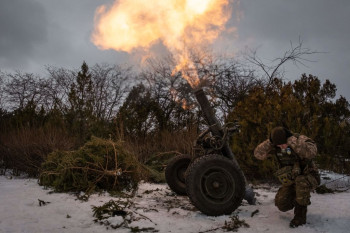Since the start of the full-scale invasion, Russia's army and private mercenary groups have likely lost 175-200,000 people in Ukraine, of which up to 60,000 were killed, the U.K. Defense Ministry reported on Feb. 17.
Prisoners recruited by the Kremlin-backed private mercenary Wagner Group have allegedly suffered a casualty rate of up to 50%.
"The Russian casualty rate has significantly increased since September 2022 when 'partial mobilization' was imposed," reads the report.
These figures demonstrate a high ratio of troops killed compared to those injured by modern standards of warfare, according to the ministry.
"This is almost certainly due to extremely rudimentary medical provision across much of the force," the U.K. Defense Ministry wrote on Twitter. The largest share of Russian losses among personnel is caused by artillery, it added.
The General Staff of Ukraine's Armed Forces said on Feb. 17 that Russia had lost 141,260 troops in Ukraine since Feb. 24 last year.










